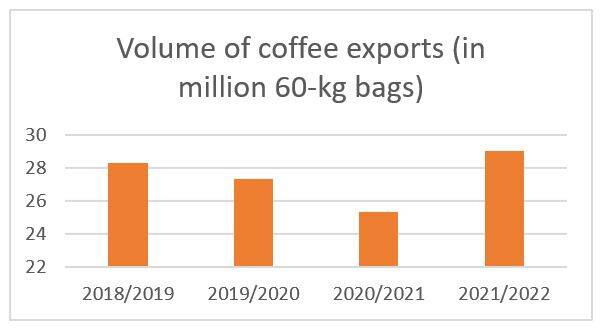European Union Deforestation free Regulation awakens Vietnam's coffee industry
In the heartland of Vietnam's Central Highlands, where the scent of coffee blends with the crisp morning air, a story unfolds, much like the careful process of crafting the perfect cup of coffee. This story is not just about the rich, smooth brew that awakens the senses; it's a tale of change, reflecting coffee's journey from crop to cup. The story involves the European Union Deforestation free Regulation (EUDR) intersecting with Vietnam's thriving coffee industry, a mix of heritage, sustainability, and transformation.

Navigating change amid challenges
On June 29th, 2023, the "Conference on deforestation-free coffee production and supply in line with European Union regulation" was held in Hanoi. This event was a mosaic of challenges and possibilities. It was a day when the sector collectively paused to consider the hurdles and chances woven into the fabric of coffee farming.

Vietnam's coffee market, valued at over $3.5 billion, has a distinct connection with the European Union (EU). This connection is most evident as around 70% of Vietnam's coffee enters EU markets—an intersection that emphasizes the EU's crucial role in shaping the influence of EUDR on the industry. Amidst this collaboration lies a delicate equilibrium to be struck, ensuring that the regulations do not inadvertently support deforestation.
From beans to brew: challenges evolving into opportunities
Stepping into this coffee journey, we delve into facts that tell a captivating story of scale and effect. The coffee sector spans more than 30 provinces, impacting over 2.6 million households. This impact extends beyond borders, touching the lives of more than 30 million coffee enthusiasts worldwide across 80 countries. However, EUDR arrives as not just a set of rules but as a catalyst for transformation. The obstacles it presents aren't barriers; they're stepping stones towards transparency and sustainability. What appear as challenges today could well become tomorrow's opportunities, changing Vietnam's coffee industry into a model of responsible trade globally.
The very essence of coffee's journey—from bean to cup—parallels the transformation of the industry under EUDR's influence. The story begins on the farms, where coffee plants sway against the backdrop of green landscapes. Here, challenges manifest as high-risk farmers living within or near forests—around 10% of them. If these farmers can not navigate the regulations, they might turn to forest destruction for income.

Yet, beneath these challenges lies the potential for progress. The complexities, costs, and intricacies of following EUDR within the set timeframe are not just obstacles; they're an invitation to shape a sector aligned with modern sustainability goals. It's an opportunity to promote transparency, empower stakeholders, and nurture not only the coffee but also the communities and environments it originates from. As the coffee cherries are meticulously picked, sorted, and processed, so too must the industry navigate the complexities of EUDR's requirements. This careful process will lead to more than compliance—it will result in a renewed commitment to sustainable practices. From monitoring supply chains to tracking coffee's journey from farms to cups, EUDR propels Vietnam's coffee sector into an era of responsibility.
Netherlands: adding flavor to the roast of transformation in Vietnam
Amidst this intricate blend of transformation, the government of the Netherlands and its embassy in Vietnam emerge as guides of this change together in a partnership with influential players like IDH, Climate Smart Agricultural practices (agriterra.org), Planting a better future via carbon credits | Acorn Rabobank, JDE Peet's, LDC, Simexco, Intimex, Hoi An Roastery and Lacaph.

In May 2023, the Netherlands showed commitment to the environmental care in Vietnam's Di Linh area, known for coffee production and forest preservation. Ambassador Kees van Baar and Consul General Daniel Stork visited Di Linh area and discussed the European Union Deforestation Regulation (EUDR) and its impact on the local coffee industry. They emphasized collaboration with IDH, local stakeholders and authorities. The discussions focused on a forest monitoring system, pilot programs and support for smallholders in high-risk areas. The Dutch government and local officials pledged support, aiming to ensure compliance with EUDR while safeguarding livelihoods and promoting sustainable practices in the coffee sector.
If you have any questions for the agriculture department please send an email to HAN-LNV@minbuza.nl. For the latest updates, news, funding opportunities and more follow us on Twitter @AgroVietnam